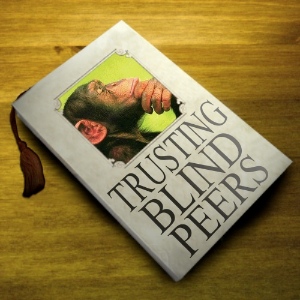Beyond academic journals?
This is my third and final post in a (rather impromptu) mini-series on academic journals and their place in the 21st century landscape. You may want to read my previous two posts here and here before reading this one?

To find a new enlightening and inspiring idea (as distinct from finding a recipe for getting safely through the peer-built barricade), browsing through thousands of journal pages is all too often called for. With my tongue in one cheek only, I’d suggest that were our Palaeolithic ancestors to discover the peer-review dredger, we would still be sitting in caves… (Zygmunt Bauman)
In my previous posts on academic journals I’ve compared them unfavourably – either explicitly or implicitly – with the kind of informal ‘peer review’ that happens through blogs and social media. Some commenters have assumed that this means that, like Bauman (see above) I’m completely against peer review. I’m not.
Peer review is valuable. In fact, it’s so important we need a (re)new(ed) academic ecosystem to protect it.
I’m all for new systems such as hypothes.is which provides an open, distributed peer review layer for the web. Although I don’t want to go into it in too much depth here, academia is one of the few unreformed areas with outdated power structures and glass ceilings.
As Stephen Thomas pointed out in the comments to my previous post, academic journals have, and still do, play an important role in both establishing precedent and providing a quality filter. This is important (most of the time).
But, as Dan Meyer pointed out in the quotation making up the bulk of my first post in this series, it’s the edifice that’s built upon the academic journal system that’s problematic:
The incentive seems strange to me… I don’t understand this brass ring I’m chasing. (Dan Meyer)
This academic edifice is built upon other perceived ‘advantages’ of academic journals, including:
- Dissemination of work
- Status
- Career progression
- Contact with others inside and outside field
Academics, unfortunately, have ended up inventing a stick with which they can be beaten. In the UK, the Research Excellence Framework (REF) is a crude instrument looking a research outputs. Career progression (and therefore status) depends upon disseminating work in journals that are, all too often, closed and paywalled.
Part of the answer, I agree, comes through academic journals becoming open access. That’s a step in the right direction (even if it does smack a little of Henry Ford’s ‘faster horses‘). Going further, something more like Alan Cann’s experiments around open peer review could work. But, realistically, we need something a bit more radical.
How can we save peer review whilst democratising and reforming higher education?
I leave you with the words of Frances Bell, who commented on my previous post:
What I suspect is that more research needs to be done on how, for example. scholarly societies can support research, scholarship and practice in a digital age. (Frances Bell)
Amen to that.


 Although I’m still yet to have an academic article published, I’ve made a public commitment to do so only in open-access journals. I’ve already dedicated this blog to the public domain (see CC0 license in footer) and shared my thesis online. Whilst for me it’s a logical continuation of my position as an open educator/academic/researcher/individual, I’ve been waiting for a compelling reason for others to ditch closed journals.
Although I’m still yet to have an academic article published, I’ve made a public commitment to do so only in open-access journals. I’ve already dedicated this blog to the public domain (see CC0 license in footer) and shared my thesis online. Whilst for me it’s a logical continuation of my position as an open educator/academic/researcher/individual, I’ve been waiting for a compelling reason for others to ditch closed journals.